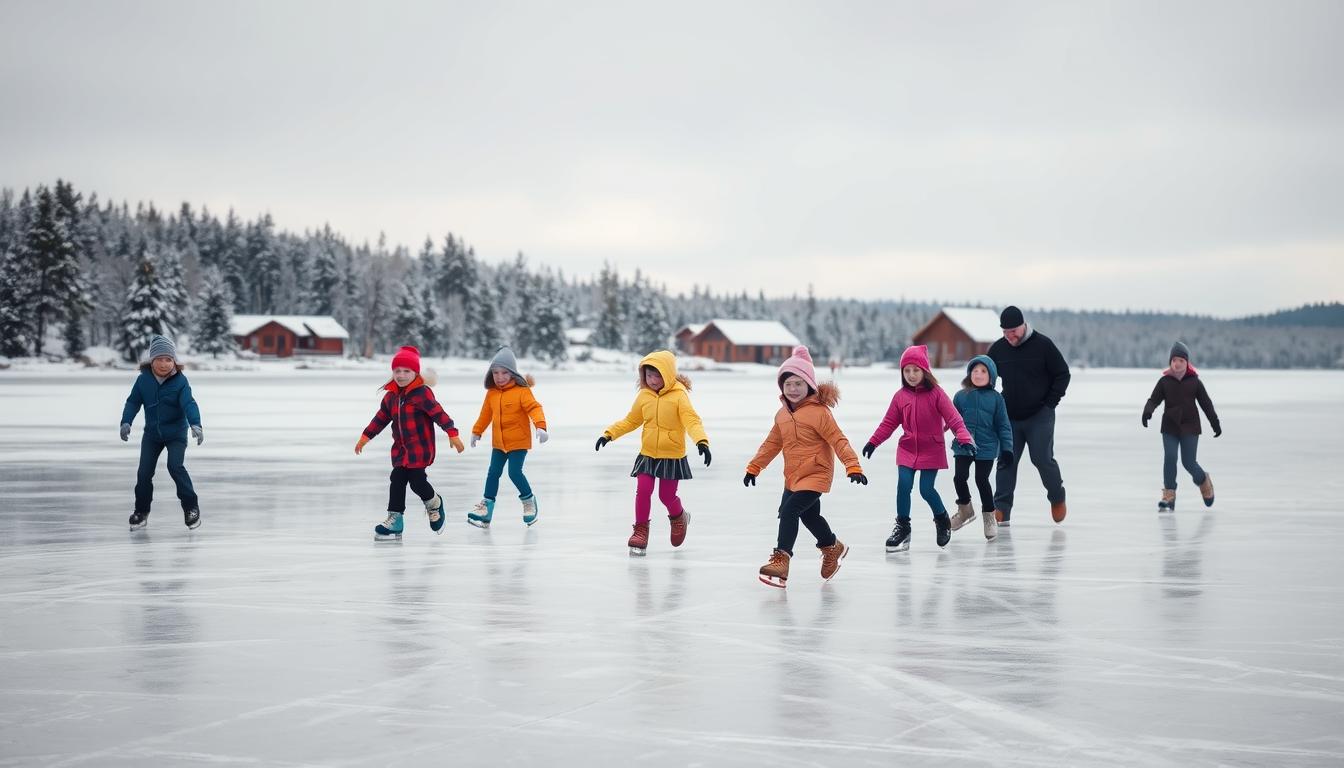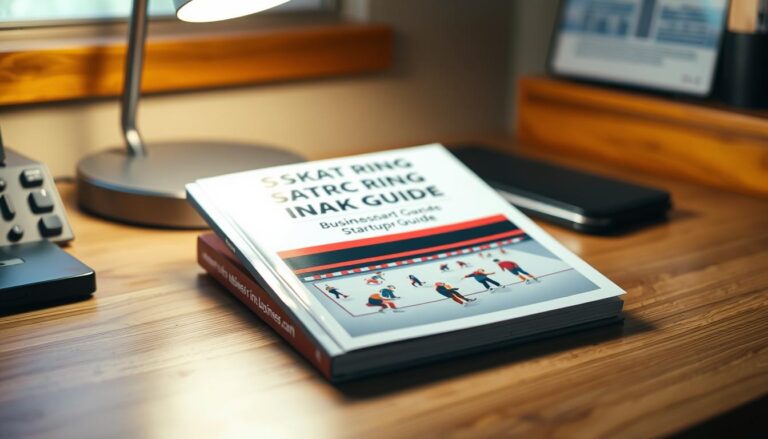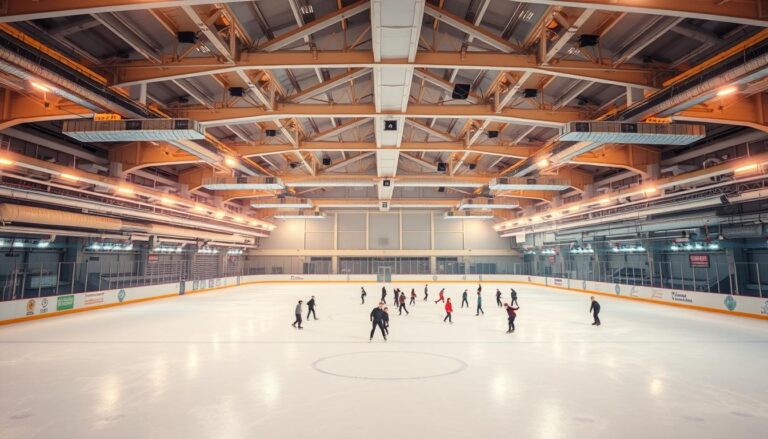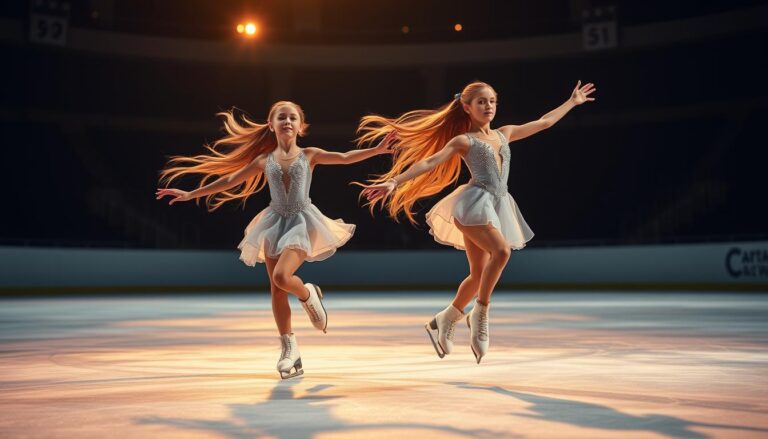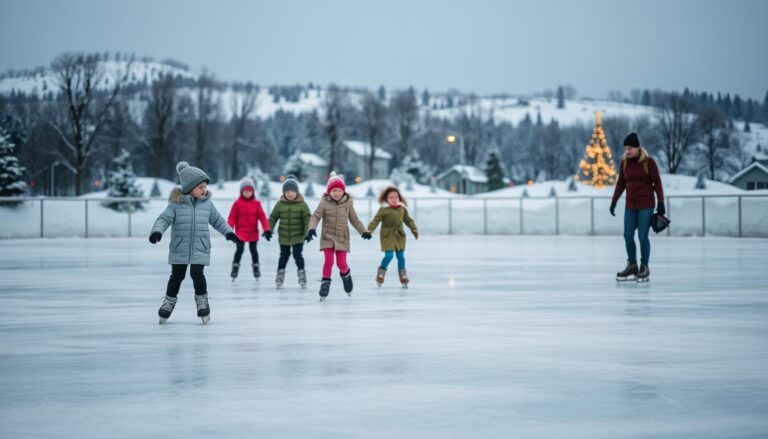What Age to Start? The Ideal Age to Begin Ice Skating
Ice skating is an exciting journey that can start at any age. It can become a lifelong passion, whether you’re young or old.
Many people wonder when it’s best to start ice skating. Experts say different ages have their own benefits for learning this sport.
Children aged 3-5 are very adaptable on the ice. They are flexible, fearless, and learn quickly. Their bodies are also more open to new movements.
Kids aged 6-10 are also great for starting ice skating. They have better thinking skills, coordination, and strength. This age is perfect for learning because they are both physically and mentally ready.
Don’t worry if you’re an adult wanting to start. Many skating programs welcome beginners of all ages. The most important thing is to find training that fits your abilities and learning style.
Several things affect the best age to start ice skating. These include physical and mental readiness, good instruction, and motivation. Everyone’s journey is unique, based on their goals and effort.
Coaches say it’s all about having fun, staying safe, and improving slowly. No matter your age, ice skating can be a magical and rewarding experience.
Understanding the Fundamentals of Ice Skating Development
Figuring out the best age to start ice skating is all about knowing how kids grow and learn. Every child starts with basic skills that help them move smoothly on the ice.
Learning to skate involves hitting several important stages. Parents and kids should know the key physical steps that help in mastering ice skating.
Physical Development Milestones for Skating
Kids usually get ready to skate between ages 3 and 7. They need to have:
- Stable walking and running patterns
- Improved coordination and balance
- Stronger legs and core muscles
- Better sense of space
Core Strength and Balance Requirements
Skating needs great core strength and balance. The right age to start skating should match a child’s ability to:
- Stay balanced on one foot
- Control their body movements
- Show basic sense of body position
Motor Skills Development in Young Skaters
The best time to start ice skating depends on a child’s motor skills. Kids with strong gross motor skills usually do better on the ice.
Pro tip: Look for natural athletic ability and a love for trying new things as signs of skating readiness.
The Benefits of Starting Ice Skating Early
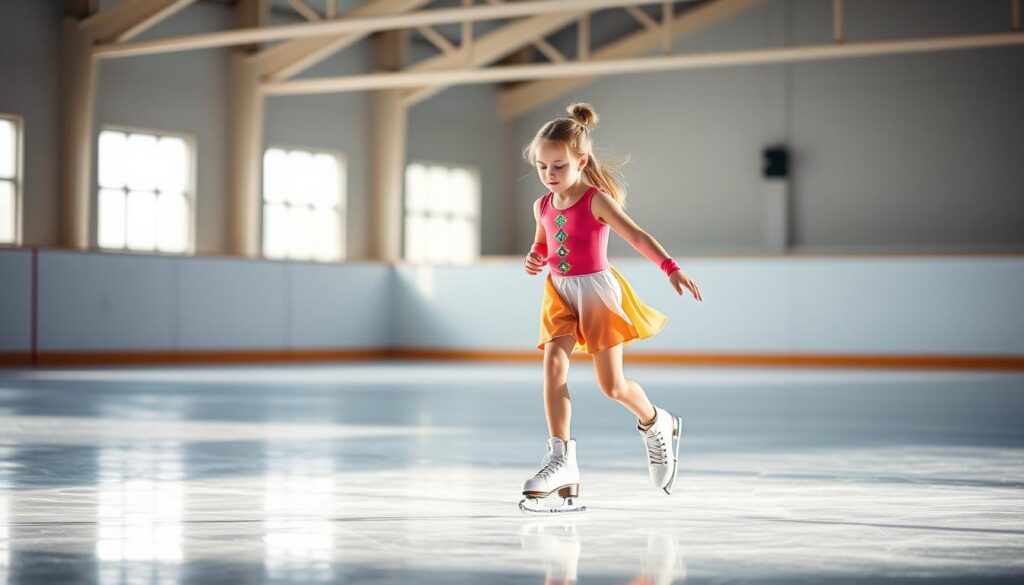
Figuring out the best age to start ice skating opens up a world of benefits for kids. It’s not just a fun activity. It’s a chance for them to learn important life skills that go beyond the rink.
Ice skating early on offers amazing physical and mental benefits. Kids who skate young tend to:
- Improve their balance and coordination
- Develop better motor skills
- Get a stronger sense of their body
- Build stronger core muscles
Experts say starting ice skating early can boost a child’s athletic abilities. The best time is between ages 3-6. Kids are naturally curious and their bodies are ready to learn during this age. Their brains soak up new skills and movements easily.
Ice skating also helps with important mental skills:
- Boosts self-confidence
- Teaches persistence
- Improves social skills
- Helps understand structured learning
By making ice skating a key part of a child’s life, parents help them build a strong athletic foundation. This foundation helps with many life skills. The rink becomes a place for personal growth and learning.
What Age to Start Ice Skating: Expert Recommendations
Figuring out when to start ice skating is a big decision. Experts from many fields have given their advice. They help parents and kids know when it’s time to hit the ice.
Professional Coaches’ Perspectives
Top ice skating coaches say kids can start learning to skate between 3 and 5 years old. At this age, kids are getting better at moving and balancing. This makes it easier for them to skate.
They look at a few things:
- Physical coordination
- Balance and core strength
- Emotional readiness
- Ability to follow instructions
Sports Medicine Insights
Sports medicine experts say starting ice skating age depends on how physically developed a child is. They focus on:
- Muscle strength and flexibility
- Joint stability
- Cognitive understanding of movement
Research-Based Age Guidelines
Research from skating groups gives detailed advice for different skating goals. Recreational skating can start early, but competitive training usually begins at 6-8 years old.
Experts stress that every child grows at their own pace. The most important things are their interest, good teaching, and a supportive place to learn.
Starting Ice Skating as a Toddler: Pros and Cons
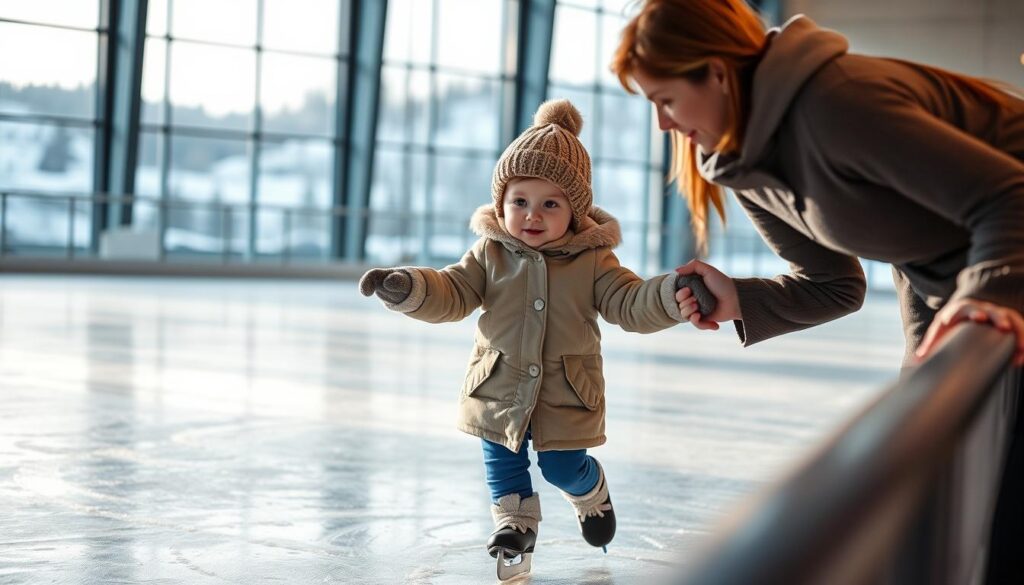
Introducing toddlers to ice skating is exciting for parents. It opens up the world of early sports development. The best age to start ice skating for toddlers is between 2 and 4 years old. This age is perfect for learning new skills.
Parents thinking about starting their toddlers on ice skating should know the pros and cons. Here are some points to consider:
- Natural Skill Development: Toddlers learn fast and can improve balance and coordination easily.
- Lower Fear Threshold: Young kids are less scared of new things.
- Enhanced Physical Confidence
- Early Motor Skills Improvement
But, there are challenges too. Toddlers might get distracted easily and need constant watch. “Parent and tot” classes help by letting parents join in the fun.
When it comes to toddler ice skating, consider these:
- Choose classes that fit their age.
- Make sure they wear the right safety gear.
- Keep it fun and not too serious.
- Look for signs that they’re ready.
Experts say to focus on fun, not just learning skills at this age. The goal is to make ice skating a lifelong joy.
Beginning Ice Skating During Elementary School Years
The elementary school years are a great time for kids to start ice skating. This age is perfect for learning because it’s both fun and easy. Kids aged 6 to 10 have the right mix of physical and mental skills to learn skating well.
Elementary school is the best time to start ice skating. Kids at this age can learn fast and grow emotionally. They show great promise in learning new skills and growing as individuals.
Physical Readiness Indicators
- Improved muscle coordination
- Enhanced balance and spatial awareness
- Increased strength and endurance
- Better body control and reflexes
Mental Preparation Aspects
Elementary-aged kids also get better at thinking and learning:
- Ability to follow structured instructions
- Increased attention span
- Willingness to practice and learn
- Growing goal-setting capabilities
Social Development Benefits
| Social Skill | Skating Impact |
|---|---|
| Teamwork | Group lessons encourage collaboration |
| Confidence | Mastering new skills builds self-esteem |
| Communication | Interaction with coaches and peers |
| Friendship | Shared experience creates bonds |
Skating during elementary years transforms physical activity into a powerful developmental experience, blending fun, fitness, and personal growth.
Is It Ever Too Late to Start Ice Skating?
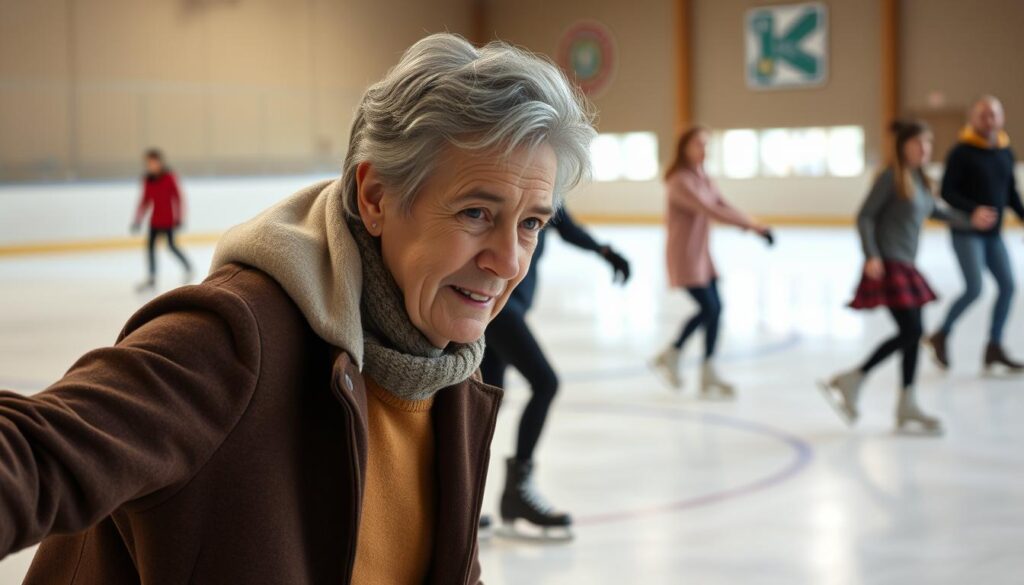
Wondering when to start ice skating? The exciting news is that it’s never too late to lace up those skates and hit the ice! Many people think ice skating is only for kids, but adults can enjoy it too.
Adults have special advantages when learning ice skating. Your body awareness and mental focus can help you learn fast. The best age to start ice skating is when you’re passionate and committed.
- Physical benefits include improved cardiovascular fitness
- Mental advantages involve stress reduction and increased confidence
- Social opportunities to meet new people and join a community
Fear of falling or looking awkward might hold you back. But remember, every skater started as a beginner. Professional skating instructors are trained to work with adult learners and can help you build skills safely.
Many rinks offer adult-only classes for a comfortable learning environment. These classes let you learn at your own pace, with others who are new to the sport.
Success stories abound of adults who found their love for ice skating later in life. Whether you’re in your 20s, 40s, or even 60s, the ice welcomes everyone willing to learn and have fun!
Essential Safety Considerations Based on Age Groups
Ice skating is a fun activity that needs careful safety attention, more so when figuring out the right age to start. Knowing the safety rules for each age helps parents and skaters decide when it’s time for kids to hit the ice.
Safety isn’t just about wearing the right gear. It’s also about making a safe place for young skaters to learn and grow. The right approach keeps injuries low and fun high.
Protective Gear Requirements
Each age group needs its own safety gear to stay safe on the ice. Here are the must-haves:
- Toddlers (2-4 years): Helmet, soft knee and elbow pads
- Young Children (5-8 years): Helmet, wrist guards, padded shorts
- Older Children (9-12 years): Helmet, protective padding, specialized skating gloves
- Teenagers and Adults: Helmets, optional protective gear based on skill level
Age-Specific Safety Guidelines
Knowing the safety rules for each age group makes skating fun and safe. Watching over kids and teaching them the right way to skate is key to starting at the right age.
| Age Group | Recommended Supervision | Skill Focus |
|---|---|---|
| 2-4 years | Direct parental supervision | Balance and basic movement |
| 5-8 years | Structured group lessons | Basic skating techniques |
| 9-12 years | Instructor-led training | Advanced skills and safety techniques |
Risk Assessment Factors
Figuring out if a child is ready to skate involves checking their physical and mental skills. Not every child learns at the same pace, so it’s important to assess each one individually.
- Physical coordination
- Balance and core strength
- Willingness to learn
- Comfort with cold environments
By focusing on safety and matching gear and lessons to a child’s age and skill, everyone can have a great time on the ice.
Developmental Stages in Ice Skating Learning
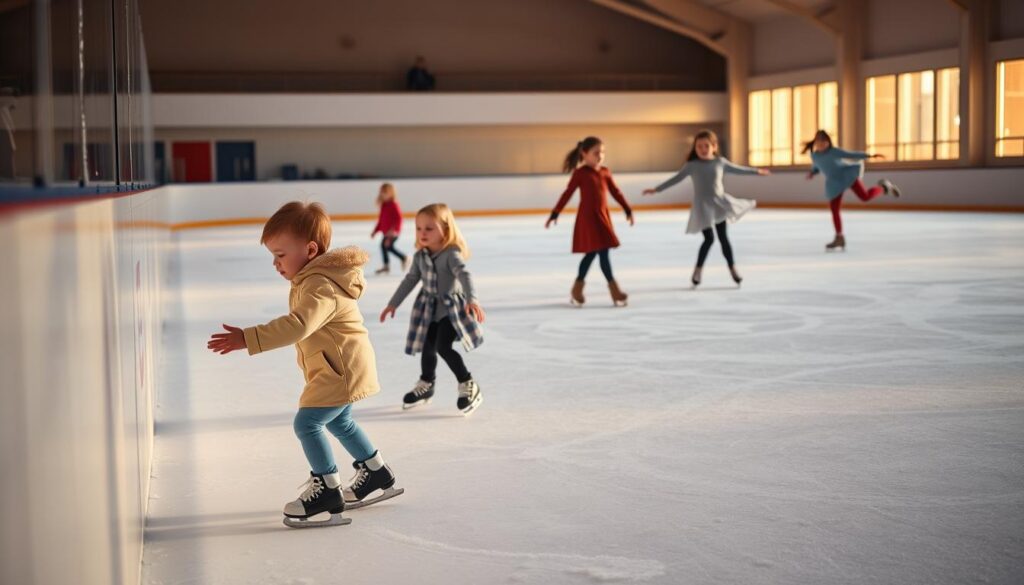
Learning ice skating is a unique journey with different stages. Knowing these stages helps skaters understand their progress. It also helps them set realistic goals for when to start.
The path to mastering ice skating changes based on when you start. Young learners go through various skill-building phases:
- Fundamental Balance Stage (Ages 3-5)
- Basic standing on ice
- Learning initial gliding techniques
- Developing core muscle strength
- Technical Skill Building Stage (Ages 6-9)
- Mastering forward and backward skating
- Introduction to stopping techniques
- Basic edge control
- Advanced Movement Stage (Ages 10-14)
- Complex skating patterns
- Initial jump and spin preparations
- Enhanced coordination skills
Each stage has its own challenges and opportunities. Skaters starting at different ages will experience these stages in their own way. Younger learners often pick up physical movements faster.
| Age Group | Skill Development Focus | Typical Achievements |
|---|---|---|
| 3-5 Years | Balance & Confidence | Standing, Basic Gliding |
| 6-9 Years | Technical Fundamentals | Directional Control, Stopping |
| 10-14 Years | Advanced Techniques | Jumps, Spins, Complex Movements |
Coaches say age is important, but motivation and practice are key. These are what really help you move through the stages.
Choosing the Right Program for Different Age Groups
Finding the right ice skating program is key. It depends on your skill level, age, and how you learn. Knowing when to start can make a big difference in your fun and success on the ice.
Each age group needs its own way of learning to skate. Kids, teens, and adults all have different needs. They need lessons that fit their physical abilities and how they learn best.
Beginner Programs Tailored by Age
- Toddler Programs (Ages 3-5): Focus on basic balance and fun
- Child Programs (Ages 6-10): Develop fundamental skating skills
- Teen Programs (Ages 11-16): Advanced technique and possible competitive training
- Adult Programs (17+): Skill-based learning with flexibility
Skill Development Progression
The best time to start ice skating changes, but moving up in skills is important. Programs should have clear goals. This helps skaters grow in confidence and skill step by step.
Class Size and Structure
Think about these when picking a program:
- Instructor-to-student ratio
- Class length
- Chances for one-on-one help
- Safety rules
Your ideal skating program is out there. Choose well and have fun!
Common Challenges for Different Age Groups
Learning to ice skate is different for everyone, no matter your age. Knowing what challenges you might face can help you enjoy your skating more. It’s important to know when to start ice skating and the right age to begin.
Challenges for Young Children
Toddlers and preschoolers have their own ice skating hurdles. They struggle with:
- Limited attention spans
- Fear of falling
- Need for constant encouragement
- Developing basic motor skills
Obstacles for Older Children and Teens
As kids get older, new skating challenges come up. These include:
- Self-consciousness about performance
- Peer pressure and social anxiety
- Balancing skating with other activities
- Managing expectations and skill development
Adult Learner Challenges
Adults starting ice skating face unique mental and physical barriers. These include:
- Fear of injury
- Unrealistic expectations
- Limited practice time
- Physical conditioning concerns
| Age Group | Primary Challenges | Recommended Strategies |
|---|---|---|
| Children (3-6) | Short attention, fear of falling | Playful lessons, positive reinforcement |
| Older Children (7-12) | Social anxiety, skill comparison | Group classes, skill-based progression |
| Teens (13-18) | Performance pressure | Confidence-building techniques |
| Adults (19+) | Time constraints, injury fears | Flexible scheduling, proper training |
Pro tip: Every challenge is an opportunity to grow stronger and more confident on the ice. Embrace the learning process, regardless of your age!
Success Stories: Starting at Various Ages
Ice skating shows that passion has no age limit. Whether you’re curious about the best age to start or the recommended age, real stories show the amazing abilities of skaters from all ages.
Every skater’s journey is unique, with each one bringing their own experiences to the ice. Let’s look at inspiring stories that highlight the variety of skating success.
Youth Skating Triumphs
Young skaters who start early often show incredible skills and confidence. Nathan Chen, an Olympic figure skater, started skating at five. His early start helped him master complex techniques.
- Early starters develop muscle memory quickly
- Consistent practice leads to exceptional skill development
- Young skaters build confidence through gradual progression
Adult Skating Journeys
Many adults find their passion for skating later in life. It shows that it’s never too late to start. Some enjoy learning basic skills, while others compete in local events.
| Age Group | Typical Achievements | Learning Curve |
|---|---|---|
| 20-30 years | Basic Skills Mastery | Moderate |
| 30-40 years | Recreational Skating | Slower but Steady |
| 40-50 years | Personal Fitness Goal | Gradual Progression |
Professional Skater Perspectives
Professional skaters share unique insights about their journeys. Michelle Kwan, who started skating at eight, says dedication is key, not the age you start.
Ice skating offers a chance for personal growth, fitness, and fun, no matter when you start. Your skating story is just beginning!
Setting Realistic Expectations Based on Starting Age
Knowing what to expect is key when deciding when kids should start ice skating. Every child’s progress is different. It depends on their growth and when they start.
For little ones, ice skating is about having fun and learning the basics. Toddlers and preschoolers pick up skills through play. They work on basic movements and balance.
- Ages 3-5: Focus on fun and basic movement
- Ages 6-8: Start learning more structured skating techniques
- Ages 9-12: Can learn more advanced skills
Realistic skill progression depends on several key factors:
- Individual physical coordination
- How often they practice
- The quality of their lessons
- How motivated they are
Older kids and teens can pick up skills quicker. They have better muscle control and understand things better. Adults might need more time to get used to it physically.
The most important thing in ice skating is staying positive. Enjoy the small wins, learn from mistakes, and remember everyone’s journey is unique.
Conclusion
Finding the right age to start ice skating isn’t just about a number. It’s about when you’re ready and passionate. Whether you’re a curious kid or an adventurous adult, ice skating welcomes everyone. The key is your motivation, physical readiness, and love for it.
What matters most is wanting to learn and grow. Coaches say the best time to start varies for everyone. Some begin at three, while others find their passion in their twenties or thirties. Every journey is unique, with its own challenges and victories.
Safety, good training, and a supportive place to skate are essential. Make sure to get quality lessons, wear the right gear, and stay positive. Your skating ability isn’t about when you start. It’s about your dedication to learning and enjoying it.
Are you ready to start your skating journey? The rink is waiting for you. Share your dreams, challenges, and excitement in the comments. Your ice skating story is just beginning!
